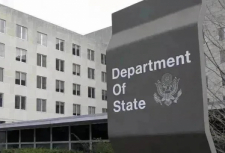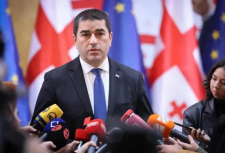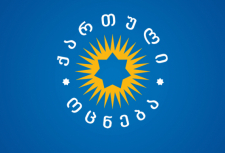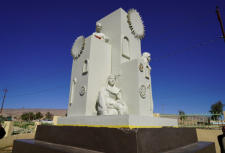The empty hopes of the Yazidi IDPs of Sinjar for all the promises of help
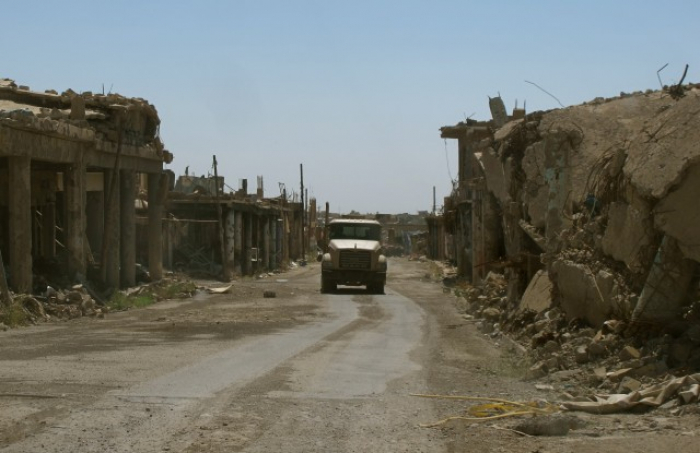
Tents of the camp of Yazidi refugees and displaced persons Mam Rashan are scattered among the plains of the Sheikhan district. Children play football, adults wander in the outskirts of the camp in search of work, some women sit on the doorsteps of their tents, watching the road that brings nothing new, and others are busy all day working on the so-called house, including Bakza Saleh Hulu, who escaped from ISIS captivity to become a victim of an unknown future.
The Mam Rashan camp for internally displaced persons was established in 2015 in stages by humanitarian organizations. It contains 1,833 tents housing 1,535 Yezidi families with a population of 7,410, the camp serves as a temporary shelter for Yezidis until they return to their homes. Displaced persons living in the camps depend on monthly assistance from the Iraqi Ministry of Migration and Displacement, which is a basket of food and medicine. In other cases, they receive various but irregular assistance from international organizations.
Bakza, who is 51 years old, fell into the hands of ISIS terrorists when they invaded the Sinjar district, her three daughters (Aziza, Louise, Luzina) were taken into slavery with her, they spent three years in captivity, then they managed to escape. Before this nightmare, Bakza lived a very happy life, her husband was a security officer of the local police.
The woman claims that after escaping from ISIS captivity, the only place where one could hide is camps for Yazidi refugees, because the areas of their original residence suffer from neglect and political conflicts. Bakza's family has been applying for participation in the program for the reception of families of ISIS victims by Australia since 2018, they have passed three interviews, but, unfortunately, the program has been stopped.
Director of the international organization "Yazda" Haider Elias said earlier that Canada and Australia will continue to accept refugees from Sinjar. According to him, the Australia program is also an initiative of his organization with the Australian side since 2016, and it continues. Now, the Australian government has accepted about 5,700 people. It is planned to accept more than 1,000 people, those who have been interviewed, now the migration process has been postponed due to the coronavirus pandemic.
On October 9, 2020, the Government of Iraq and the Kurdistan Regional Government signed, under international supervision, a security agreement to restore life in the Sinjar area, providing for the expulsion of all armed groups from the city and assigning the task of maintaining security to the local police, but, a year after its signing, the agreement has not been fulfilled.
In March of this year, the Iraqi parliament voted for a bill on Yazidi survivors, which observers considered very important for restoring at least part of the rights of ISIS victims in Iraq. This is very important from the material, medical and moral aspects, as it includes financial payments, the provision of land for living, the opening of schools for education, the provision of employment opportunities to improve their living conditions and much more.
In March 2021, the Iraqi Government approved a "National Plan for the return of IDPs to their originally liberated areas" developed by the Ministries of Immigration and Displacement. But he failed to put an end to the dossier of displaced persons in the Sinjar region, who live in 16 camps in the Dahuk region.
The Yezidis in the camps also hoped for the last elections held in Sinjar, because they were told that they were a decisive factor and would be the key to solving the problems of the Sinjar region, but today, like all the above-mentioned points, they remain just words.
Tags: #yazidisinfo #newsyazidi #aboutyazidi #iraqyazidis #genocideyazidis
The empty hopes of the Yazidi IDPs of Sinjar for all the promises of help

Tents of the camp of Yazidi refugees and displaced persons Mam Rashan are scattered among the plains of the Sheikhan district. Children play football, adults wander in the outskirts of the camp in search of work, some women sit on the doorsteps of their tents, watching the road that brings nothing new, and others are busy all day working on the so-called house, including Bakza Saleh Hulu, who escaped from ISIS captivity to become a victim of an unknown future.
The Mam Rashan camp for internally displaced persons was established in 2015 in stages by humanitarian organizations. It contains 1,833 tents housing 1,535 Yezidi families with a population of 7,410, the camp serves as a temporary shelter for Yezidis until they return to their homes. Displaced persons living in the camps depend on monthly assistance from the Iraqi Ministry of Migration and Displacement, which is a basket of food and medicine. In other cases, they receive various but irregular assistance from international organizations.
Bakza, who is 51 years old, fell into the hands of ISIS terrorists when they invaded the Sinjar district, her three daughters (Aziza, Louise, Luzina) were taken into slavery with her, they spent three years in captivity, then they managed to escape. Before this nightmare, Bakza lived a very happy life, her husband was a security officer of the local police.
The woman claims that after escaping from ISIS captivity, the only place where one could hide is camps for Yazidi refugees, because the areas of their original residence suffer from neglect and political conflicts. Bakza's family has been applying for participation in the program for the reception of families of ISIS victims by Australia since 2018, they have passed three interviews, but, unfortunately, the program has been stopped.
Director of the international organization "Yazda" Haider Elias said earlier that Canada and Australia will continue to accept refugees from Sinjar. According to him, the Australia program is also an initiative of his organization with the Australian side since 2016, and it continues. Now, the Australian government has accepted about 5,700 people. It is planned to accept more than 1,000 people, those who have been interviewed, now the migration process has been postponed due to the coronavirus pandemic.
On October 9, 2020, the Government of Iraq and the Kurdistan Regional Government signed, under international supervision, a security agreement to restore life in the Sinjar area, providing for the expulsion of all armed groups from the city and assigning the task of maintaining security to the local police, but, a year after its signing, the agreement has not been fulfilled.
In March of this year, the Iraqi parliament voted for a bill on Yazidi survivors, which observers considered very important for restoring at least part of the rights of ISIS victims in Iraq. This is very important from the material, medical and moral aspects, as it includes financial payments, the provision of land for living, the opening of schools for education, the provision of employment opportunities to improve their living conditions and much more.
In March 2021, the Iraqi Government approved a "National Plan for the return of IDPs to their originally liberated areas" developed by the Ministries of Immigration and Displacement. But he failed to put an end to the dossier of displaced persons in the Sinjar region, who live in 16 camps in the Dahuk region.
The Yezidis in the camps also hoped for the last elections held in Sinjar, because they were told that they were a decisive factor and would be the key to solving the problems of the Sinjar region, but today, like all the above-mentioned points, they remain just words.
Tags: #yazidisinfo #newsyazidi #aboutyazidi #iraqyazidis #genocideyazidis

